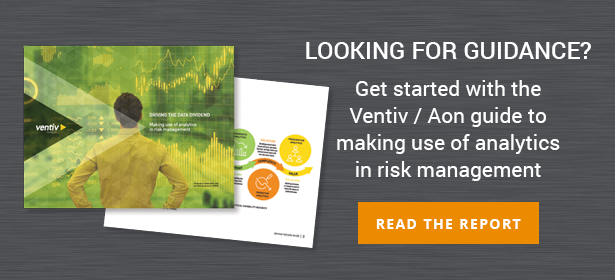Ventiv's Bjoern Heck, German territory manager, recently spoke with Commercial Risk Europe on the importance of corporates building their own risk management systems to avoid becoming overdependent on the services of brokers and insurers. Read on for the full story.
The ability to capture and use risk data is becoming increasingly important in the risk management space. For risk managers and insurance buyers, risk data can inform decisions on risks and risk transfer, while for brokers and carriers, it is seen as a competitive advantage, presenting opportunities to attract and retain clients, sell services and sharpen risk selection.
Data is also increasingly relevant in meeting the challenges of a changing risk environment. Solutions to large and complex risks, like cyber or supply chain disruption, require more information, while underwriters are requesting more granular data on traditional risks as they look to manage more volatile large losses and the impact of climate change.
Given the potential value, it should not come as a surprise that risk data is beginning to be recognised as a corporate asset, a valuable weapon in the natural combat between insurers, brokers and their corporate customers. Brokers and insurers will increasingly vie for ‘data supremacy’, competing for the right to act as the gatekeeper for their customers’ risk data.
An insurance industry that controls access to risk data raises important questions for large corporates, in particular around the independence of their data. A growing number of risk and insurance managers are concerned that a lack of data independence could be a disadvantage during renewal negotiations with insurers. Binding themselves to the systems of a broker or insurer, could also make moving provider more complicated, raising questions around data portability and continuity of service.
If corporate insurance buyers do not take control of their data, they risk becoming dependent on their broker or insurer. Yet these organisations currently struggle to provide them with information on a global scale. In some respects, the insurance industry is still in the dark ages when it comes to data maturity. The industry’s customers are making the move to a modern data approach, but many insurers still struggle with legacy systems, and policyholder’s access to insurance data is limited and fragmented.
A small number of brokers and insurers have developed portals to give corporate customers access to data and information on their multinational risks, insurance documentation and claims. Yet, even these platforms are proprietary and relate only to a given insurer’s services - buyers with multiple programmes and/or multiple brokers and carriers are unable to view all their insurance information in one place.
At Ventiv we find risk managers and insurance buyers are apprehensive about giving away their data and are looking for technology solutions to manage their risk data. The most advanced large corporates are already laying the foundations for data independence, using risk management systems like those provided by Ventiv to put them on a much stronger footing.
Avoiding an overdependence on insurance providers is not the only reason to control your own data going forward. Corporate governance, insurance contract law and a raft of compliance challenges will increasingly require companies to document risk information and processes. While the evolving risk landscape will place growing demands on risk management functions to manage risk and provide data to inform decisions on risk and investments in mitigation and loss prevention.
Quality risk data is vital when placing insurance, especially in a hardening insurance market, where a lack of information can result in higher prices and even the withdrawal of capacity. Underwriters appreciate trusted data and customers with quality information can potentially realise significant gains, including more competitive premiums and/or terms and conditions. Insurers may also be more willing to extend cover to companies that provide more granular data on their exposures, or that can demonstrate measures taken to mitigate the risks.
Risk and insurance managers need data independence if they are to survive and provide value in their organisations. By building the foundations of a risk management platform today, companies will not only control their data, they will be in a much stronger position when developing their risk management capabilities and when negotiating cover with their insurers.
Bjoern Heck is the German territory manager at Ventiv Technology. Contact Bjoern at Bjoern.Heck@Ventivtech.com 














